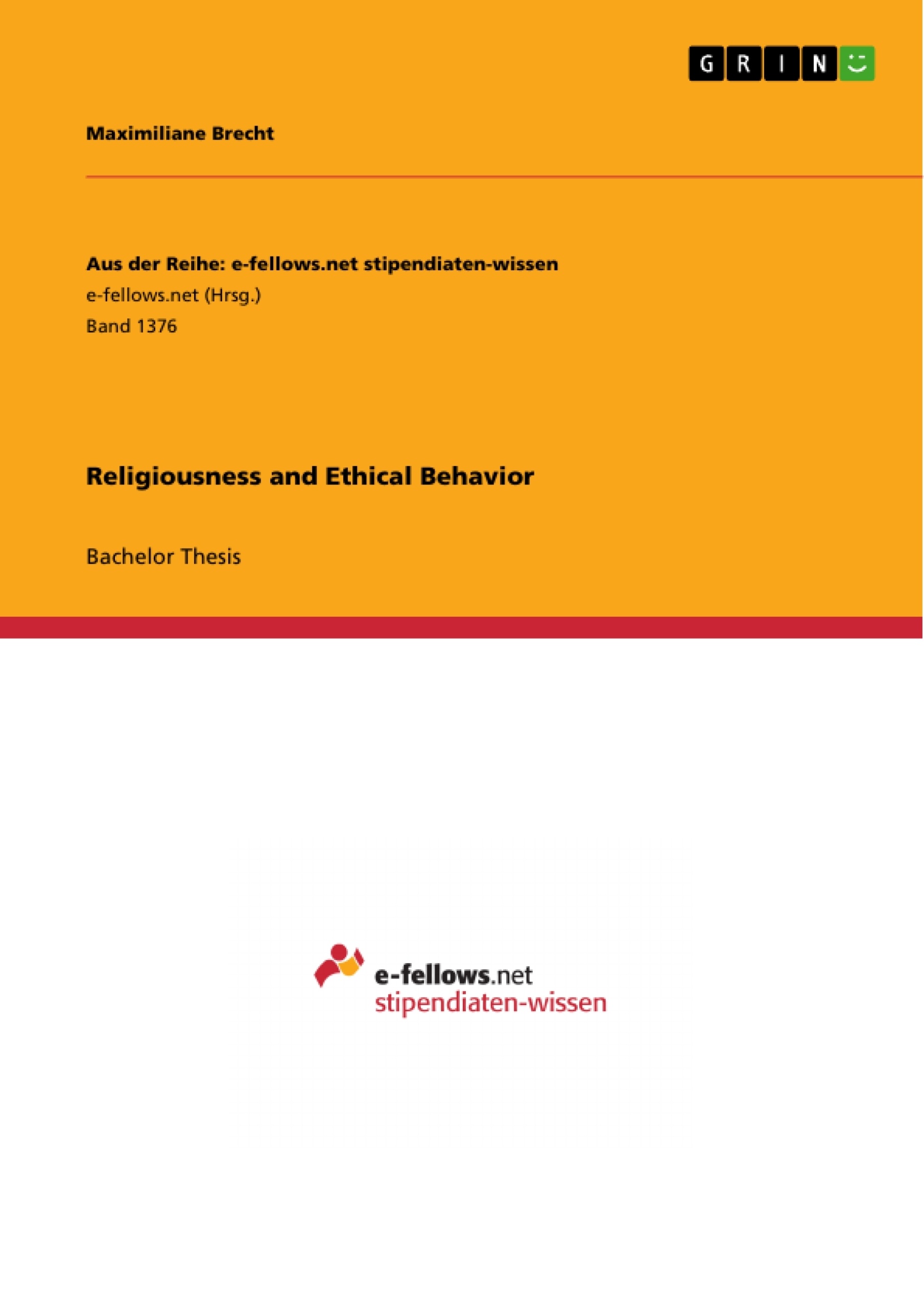Many times and across disciplines, religiousness has been proposed to positively influence ethical behavior, but empirical findings were often inconclusive or contradictory.
Following recent studies, this study discerns between religious beliefs, commitment as well as participation and conjectures that religious participation alone does not have an effect on ethical conduct, but only in interaction with religious beliefs or religious commitment. Furthermore it is proposed that religious people are stricter when it comes to misbehavior
in private contexts, but equally strict as non-religious people when the victim of that behavior is society. Using a large Dutch population sample, this study indicates that the effect of a religious attitude in terms of affection or cognition to be stronger when church services are attended regularly. In accordance with expectations, religious adherence and a strong religious commitment are found to have a significantly negative influence on the acceptance of unethical behavior. However, contrary to prior expectations, religious beliefs alone seem to have a positive impact on the willingness to justify certain transgressions. Looking at the victim of misbehavior, the results do not imply a general tendency that religious people discern more between misbehavior in private and in public contexts than non-religious people do.
Inhaltsverzeichnis (Table of Contents)
- Introduction to religion and ethics.
- Hypotheses
- For religious people only? Religious participation promotes moral behavior... except for non-believers
- The impact of religiousness languishes when the victim is not thy neighbor, but thy society
- Data description and summary statistics.
- Independent variables.
- Dependent variables
- Control variables
- Results
- H1: Interaction between different religious dimensions
- H2: Context-dependent judgments of unethical behavior
- Conclusion.
- Discussion
- References
Zielsetzung und Themenschwerpunkte (Objectives and Key Themes)
This study aims to investigate the relationship between religiousness and ethical behavior, specifically exploring how religious participation, beliefs, and commitment influence ethical decision-making. It examines whether religious participation alone impacts ethical conduct or requires interaction with beliefs or commitment. Additionally, the study explores whether religious individuals are more strict about unethical behavior in private contexts compared to public contexts. Key themes: * The influence of religiousness on ethical behavior. * The interaction between religious participation, beliefs, and commitment. * The impact of religiousness on ethical judgments in different contexts. * The effect of religiousness on the acceptance of unethical behavior.Zusammenfassung der Kapitel (Chapter Summaries)
The first chapter provides a comprehensive introduction to the topic of religion and ethics, highlighting its importance in economic and business science. It discusses the complexities of moral behavior and various models developed to understand its determinants. Chapter two outlines the research hypotheses. The first hypothesis explores the interaction between religious participation, beliefs, and commitment in influencing ethical behavior. The second hypothesis examines the role of religiousness in shaping judgments of unethical behavior in different contexts.Schlüsselwörter (Keywords)
The study focuses on the relationship between religiousness, ethical behavior, and decision-making. Key concepts include religious participation, beliefs, and commitment; moral judgments; ethical behavior in private and public contexts; and the acceptance of unethical behavior.Frequently Asked Questions
Does religious participation alone promote ethical behavior?
According to the study, religious participation alone does not have a significant effect on ethical conduct; it only works in interaction with religious beliefs or religious commitment.
Are religious people stricter regarding misbehavior than non-religious people?
The study suggests that religious individuals are stricter when it comes to unethical behavior in private contexts, but show similar levels of strictness to non-religious people when the victim is society as a whole.
What was the data source for this research?
The findings are based on a large Dutch population sample, utilizing summary statistics and various independent and dependent variables to measure religiousness and ethics.
How do religious beliefs alone impact the justification of transgressions?
Contrary to expectations, the study found that religious beliefs alone seem to have a positive impact on a person's willingness to justify certain transgressions.
What are the key dimensions of religiousness explored in this study?
The study discerns between three main dimensions: religious beliefs, religious commitment (affection/cognition), and religious participation (such as attending church services).
- Citar trabajo
- Maximiliane Brecht (Autor), 2014, Religiousness and Ethical Behavior, Múnich, GRIN Verlag, https://www.grin.com/document/300165



